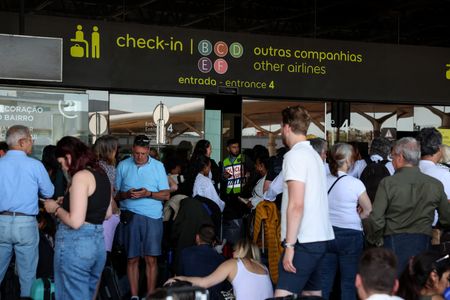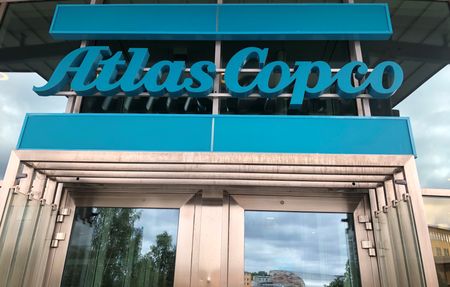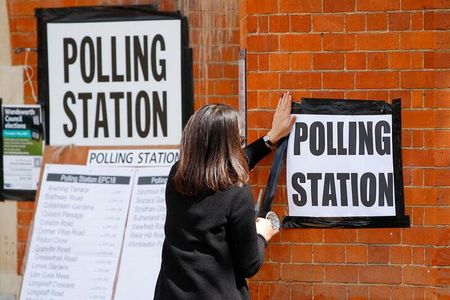By Selena Li, Lawrence White and Sinead Cruise
HONG KONG/LONDON (Reuters) -HSBC warned that loan demand and credit quality could suffer from the broader fallout of U.S. President Donald Trump’s global trade war, signalling tougher times for trade-focused banks even as the lender’s first quarter profit beat forecasts.
Europe’s largest bank reaffirmed targets and unveiled a fresh $3 billion share buyback as it reported first quarter profit before tax of $9.5 billion compared with $12.7 billion a year earlier, mainly due to one-time charges related to business disposals in Canada and Argentina.
Analysts had expected pre-tax profit of $7.8 billion for Europe’s biggest lender by assets. HSBC’s Hong Kong shares were up 3.2%, against a flat Hang Seng benchmark, while London-listed stock was trading 2.1% higher at 0756 GMT.
The earnings update from HSBC, which is also one of the world’s largest trade financing banks, provided the clearest warning yet from a major bank on how the global ripple effects of Trump’s tariff actions could hurt lenders by dampening loan demand and business sentiment.
“We’ve looked at all our revenue streams as well as our credit portfolio to assess the various implications of such a downside scenario,” CEO Georges Elhedery told reporters on a conference call.
“The outcome of this analysis is that in an adverse but plausible downside scenario, we have a low single digit impact on our revenues and about half a billion dollars worth of additional expected credit losses,” he said.
The bank reported $900 million in expected credit losses for the quarter, including $150 million to reflect heightened economic uncertainty.
U.S.-China business customers have been particularly impacted, Elhedery said.
“We’ve seen a significant drop in volumes along the U.S.- China corridor in the sectors that have not been given a waiver or the reduction of tariffs,” the CEO told reporters.
Executives at big U.S. banks during recent earnings warned of economic turbulence after Trump unleashed sweeping tariffs on April 2. Consumers and businesses have become more cautious as Trump’s global trade war roils financial markets and raises fears of a sharp worldwide economic downturn.
Elhedery said the lender’s Mexico business would likely see some disruption but remained a “critical node” in its global trading network.
A Reuters poll showed Mexico’s economy, which stood on the brink of a technical recession last quarter, will barely grow at all this year.
Analysts at Jefferies described the earnings as strong, noting higher activity in Asia and specifically Hong Kong wealth, which posted 29% growth in new customers quarter-on-quarter.
Richard Hunter, head of markets at interactive investor, said, the increasing focus on “the growth in affluent wealth, especially in Asia, is key to the new offering.”
“Early signs of success are evident from $22 billion of new invested assets in the quarter, $16 billion of which emanated from Asia,” he said.
TARGETS UNCHANGED, OVERHAUL CONTINUES
Elhedery, a career HSBC insider promoted from the CFO role, has shaken up the bank since assuming the top role six months ago by slashing the ranks of senior managers and reorganising operating divisions along East-West lines.
That restructuring is continuing, with the bank on track to deliver $1.5 billion of annual savings by end-2026, equivalent to around 8% of total staff costs.
It expects to incur severance and other upfront costs of $1.8 billion over 2025 and 2026, in line with earlier estimates.
Despite the gloomier economic outlook, HSBC left unchanged its performance target of a mid-teens return on average tangible equity for each of the three years from 2025 to 2027, having hit 14.6% in 2024.
However, the bank said its stake in Bank of Communications (BOCOM) will drop to about 16% from 19.03%, and it will book a loss of up to $1.6 billion as a result of the Chinese bank’s fundraising by private placement of shares.
HSBC said it has also launched a strategic review of its Malta operations, which is still “at an early stage.”
Elhedery praised the UK government for measures aimed at supporting domestic growth but said crisis-era rules to insulate retail operations from higher-risk banking activities trapped liquidity, stifled competition and were now “redundant”. Together with CEOs from NatWest, Santander UK and Lloyds, Elhedery co-signed a letter to British finance minister Rachel Reeves last week, calling for reform to improve the flow of capital to businesses.
HSBC will pay an interim dividend of $0.1 a share, following a $0.87 dividend payout last year.
(Reporting by Selena Li in Hong Kong, Lawrence White and Sinead Cruise in London; Editing by Shri Navaratnam)











